Type 2 Diabetes in Adults: New Diagnosis
Medically reviewed by Drugs.com. Last updated on Sep 1, 2024.
What is type 2 diabetes?
Type 2 diabetes is a disease that affects how your body uses glucose (sugar). Normally, when the blood sugar level increases, the pancreas makes more insulin. Insulin helps move sugar out of the blood so it can be used for energy. Type 2 diabetes develops because either the body cannot make enough insulin, or it cannot use the insulin correctly. Type 2 diabetes can be controlled to prevent damage to your heart, blood vessels, and other organs.
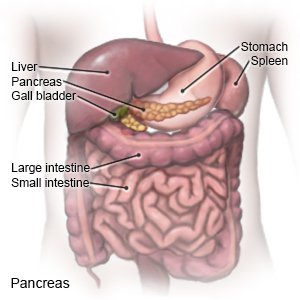 |
What increases my risk for type 2 diabetes?
- Obesity
- Lack of physical activity
- Older age
- High blood pressure or high cholesterol
- A history of heart disease, gestational diabetes, or polycystic ovary syndrome (PCOS)
- A family history of diabetes
- African American, Latino, American Indian, Asian American, or Pacific Islander heritage
What are the signs and symptoms of type 2 diabetes?
You may have high blood sugar levels for a long time before symptoms appear. You may have any of the following:
- Numbness in your fingers or toes
- Blurred vision
- Urinating often
- More hunger or thirst than usual
How is type 2 diabetes diagnosed?
You may need tests to check for type 2 diabetes starting at age 35. You may be checked sooner if you have at least 1 risk factor. Any of the following may be used to diagnose diabetes or check that it is well controlled:
- An A1c test shows the average amount of sugar in your blood over the past 2 to 3 months. Your diabetes care team provider will tell you the A1c level that is right for you.
- A fasting plasma glucose test is when your blood sugar level is tested after you have not eaten for 8 hours.
- A 2-hour plasma glucose test starts with a blood sugar level check after you have not eaten for 8 hours. You are then given a glucose drink. Your blood sugar level is checked after 2 hours.
- A random glucose test may be done any time of day, no matter how long ago you ate.
How is type 2 diabetes treated?
The goal of treatment is to prevent or delay complications of diabetes, such as heart or kidney disease. Treatment includes eating healthy foods and being active. Your providers may ask about your home life so they can create a care plan that works best for you. You may also need insulin or other medicine to help control blood sugar levels. You may need medicine to lower your risk for heart disease. An example is medicine to lower or control your cholesterol.
Treatment options
The following list of medications are related to or used in the treatment of this condition.
What is diabetes education?
Diabetes education will start right away. Diabetes education may also happen later to refresh your memory. Your diabetes care team may include physicians, nurse practitioners, community health providers, and physician assistants. It may also include nurses, dietitians, exercise specialists, pharmacists, dentists, and podiatrists. Family members, or others who are close to you, may also be part of the team. You and your team will make goals and plans to manage diabetes and other health problems. The plans and goals will be specific to your needs. Members of your diabetes care team will teach you the following:
- About your blood sugar level: You will be given information on when and how to check your blood sugar level. You will learn what to do if the level is higher or lower than your goal. Make a list of the times you checked your blood sugar level and the results of your checks. Take this to all follow-up appointments.
- A glucose meter is a device that uses a test strip to check the level. You put a small drop of blood from a finger on the test strip. The strip is put into the device. The device then figures out how much sugar is in your blood.
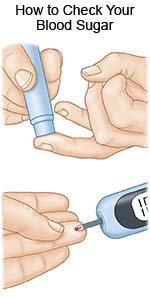
- A continuous glucose monitor (CGM) uses a sensor to check the level. The sensor is placed on your abdomen or arm. A transmitter on the sensor gets a glucose reading. CGM data may be linked to an insulin pump.
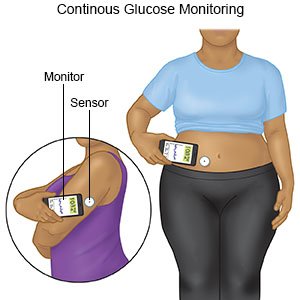
- A glucose meter is a device that uses a test strip to check the level. You put a small drop of blood from a finger on the test strip. The strip is put into the device. The device then figures out how much sugar is in your blood.
- About nutrition: A dietitian will help you make a meal plan to keep your blood sugar level steady. You will learn how food affects your blood sugar levels. You will also learn to keep track of carbohydrates (sugar and starchy foods). You will learn why it is important not to skip meals. Your blood sugar level may drop too low if you have taken diabetes medicine and do not eat. You may be taught the plate method for portion control. With the plate method, ½ of your plate contains non-starchy vegetables, ¼ contains protein, and ¼ contains carbohydrates. Your dietitian will give you examples of each kind of food to include. Ask your care team for more information about meal planning.
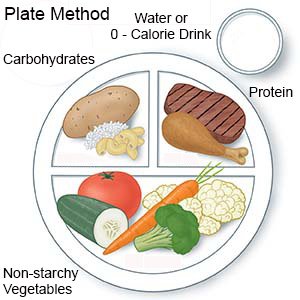
- About physical activity and diabetes: You will learn why physical activity, such as walking and strength training, is important. You and your care team provider will make a plan for your activity.

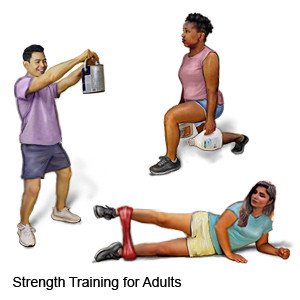
- About a healthy body weight: You will learn how a healthy weight can help you control diabetes and prevent heart disease. Ask your team what a healthy weight is for you. Ask your team to help you create a weight loss plan, if needed. Even a loss of 3% to 7% of your excess body weight can help make a difference in managing diabetes. Your team will help you set manageable weight loss goals, such as 10 to 15 pounds, or 5% of your extra weight.
- About non-insulin diabetes medicines: These medicines help control your blood sugar level and may help you maintain a healthy weight. Most non-insulin medicines are taken by mouth. Some are injected daily or weekly. You may need more than 1 medicine, depending on your A1c results over time.
- About insulin: Insulin may be used or added if non-insulin diabetes medicine becomes less effective. You will learn how much insulin you need and when to use it. You will also be taught how to match insulin with blood sugar levels, activity, and carbohydrates. Insulin may be given through a pump or pen, or injected. You and your care team will discuss the best method for you:
- An insulin pump is a wearable medical device that gives continuous insulin. An insulin pump prevents the need for multiple insulin injections in a day.
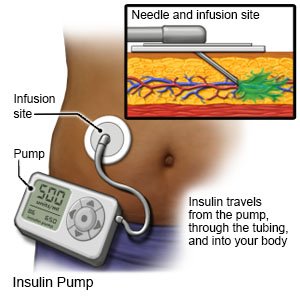
- An insulin pen is a device prefilled with insulin. Most insulin pens are disposable. You throw the pen away after it is empty or used for a certain amount of time. Some pens have a replaceable cartridge filled with insulin. You keep the pen and only throw away the cartridge.
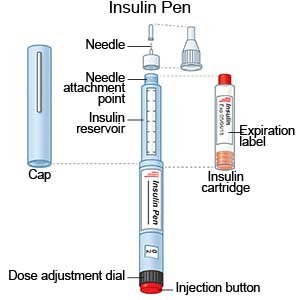
- Insulin injections are given with a needle and syringe. You and your family members will be taught how to draw up and give insulin if this is the best method for you. You will also be taught how to dispose of used needles and syringes.
- An insulin pump is a wearable medical device that gives continuous insulin. An insulin pump prevents the need for multiple insulin injections in a day.
What else can I do to manage type 2 diabetes?
- Talk to your care team providers if you have increased stress about your diagnosis. Stress about your diagnosis can keep you from taking care of yourself properly. Your team can help by offering tips about self-care. Your team may suggest you talk to a mental health provider. The provider can listen and help make self-care more manageable. Other types of counseling can help you make nutrition or physical activity changes.
- Check your feet each day for sores. Wear shoes and socks that fit correctly. Do not trim your toenails. Go to a podiatrist. Ask your care team for more information about foot care.
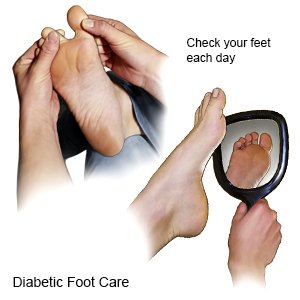
- Do not smoke. Nicotine and other chemicals in cigarettes and cigars can cause lung damage and make diabetes harder to manage. Ask your care team provider for information if you currently smoke and need help to quit. E-cigarettes or smokeless tobacco still contain nicotine. Talk to your care team provider before you use these products.
- Drink water instead of sugary drinks such as soft drinks and fruit juices. Sugary drinks increase your blood sugar level and weight.
- Know the risks if you choose to drink alcohol. Alcohol can cause your blood sugar levels to be low if you use insulin. Alcohol can cause high blood sugar levels and weight gain if you drink too much. A drink of alcohol is 12 ounces of beer, 5 ounces of wine, or 1½ ounces of liquor. Your care team can tell you how many drinks are okay to have in 24 hours and in 1 week.
- Check your blood pressure as directed. If you have high blood pressure (BP), talk to your care team about your BP goals. Together you can create a plan to lower your BP if needed and keep it in a healthy range. The plan may include lifestyle changes or medicines. A normal BP is 119/79 or lower. A normal blood pressure can help prevent or delay certain complications from diabetes. Examples include retinopathy (eye damage) and kidney damage.
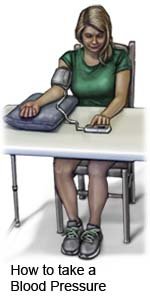
- Wear medical alert identification. Wear medical alert jewelry or carry a card that says you have diabetes. Ask your care team provider where to get these items.
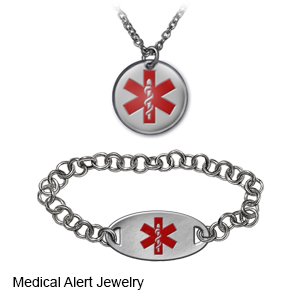
- Ask about vaccines you may need. Diabetes increases your risk for serious illness if you get certain infections. Examples include the flu, pneumonia, respiratory syncytial virus (RSV), COVID-19, and hepatitis. Ask your provider if you should get vaccines to prevent these or other diseases, and when to get the vaccines.
- Have health screenings as directed. You will need to be screened for complications of diabetes and other conditions that may develop. Diabetes that is not controlled can damage your nerves, veins, organs, and arteries. Artery damage may increase your risk for heart attack and stroke. Nerve damage may also lead to other heart, stomach, and nerve problems. Diabetes can become life-threatening if it is not controlled. Some screenings may begin right away and some may happen within the first 5 years of diagnosis.
- Have your A1c checked every 3 months, or as directed. Your care plan may need to be adjusted if the level is higher than recommended.
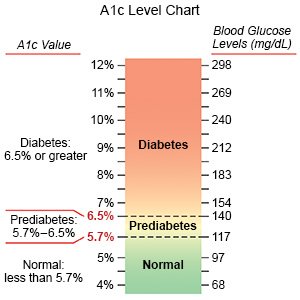
- Have screenings for complications or other problems. Examples include kidney problems, high cholesterol, high blood pressure, blood vessel problems, eye problems, PCOS, and sleep apnea.
- Keep your follow-up appointments with all providers. You will need to have your feet checked during at least 1 visit each year. You will need an eye exam 1 time each year to check for retinopathy. You will also need tests to check for kidney or heart disease, and high blood pressure. Write down your questions so you remember to ask them during your visits.
- Have your A1c checked every 3 months, or as directed. Your care plan may need to be adjusted if the level is higher than recommended.
Have someone call your local emergency number (911 in the US) if:
- You have any of the following signs of a stroke:
- Numbness or drooping on one side of your face
- Weakness in an arm or leg
- Confusion or difficulty speaking
- Dizziness, a severe headache, or vision loss
- You have any of the following signs of a heart attack:
- Squeezing, pressure, or pain in your chest
- You may also have any of the following:
- Discomfort or pain in your back, neck, jaw, stomach, or arm
- Shortness of breath
- Nausea or vomiting
- Lightheadedness or a sudden cold sweat
- You have trouble breathing.
When should I seek immediate care?
- You have severe abdominal pain.
- You vomit for more than 2 hours.
- You have trouble staying awake or focusing.
- You are shaking or sweating.
- You feel weak or more tired than usual.
- You have blurred or double vision.
- Your breath has a fruity, sweet smell.
When should I call my doctor or diabetes care team provider?
- Your arms and legs are swollen.
- You have an upset stomach and cannot eat the foods on your meal plan.
- You feel dizzy, have headaches, or are easily irritated.
- Your skin is red, warm, dry, or swollen.
- You have a wound that does not heal.
- You have numbness in your arms or legs.
- You have trouble coping with your illness, or you feel anxious or depressed.
- You have trouble following any part of your care plan, such as your meal plan.
- You have questions or concerns about your condition or care.
Care Agreement
You have the right to help plan your care. Learn about your health condition and how it may be treated. Discuss treatment options with your healthcare providers to decide what care you want to receive. You always have the right to refuse treatment. The above information is an educational aid only. It is not intended as medical advice for individual conditions or treatments. Talk to your doctor, nurse or pharmacist before following any medical regimen to see if it is safe and effective for you.© Copyright Merative 2024 Information is for End User's use only and may not be sold, redistributed or otherwise used for commercial purposes.
Learn more about Type 2 Diabetes: New Diagnosis
- Diabetes Medications and Alcohol Interactions
- FDA-Approved Weight Loss Drugs: Can They Help You?
- OneTouch Blood Glucose Meters
- Top 10 Diabetes Treatments You May Have Missed
- What is Insulin Resistance?
- Which Drugs Cause Weight Gain?
Treatment options
Care guides
Medicine.com guides (external)
Further information
Always consult your healthcare provider to ensure the information displayed on this page applies to your personal circumstances.
